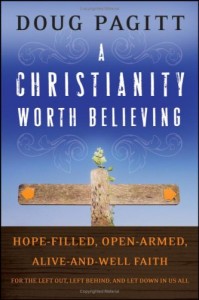
Pagitt redraws an understanding of Christianity that touches on a wholistic approach to existence. There is nothing startling if you are already engaged in the “Emergent“ conversation. However, it is still an interesting read because it is written from the perspective of a personal narrative rather than a manifesto or treatise.
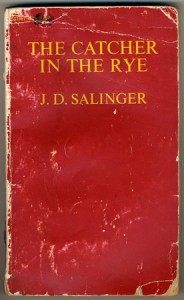
I wonder how my life would have been impacted if I had read this in my twenties? I can’t explainwhy Holden Caulfield had such a hold on me. The angst, the curiosity, the vulnerability, the self-destruction-it’s all there. Though my life is not as bold there is something powerful about wondering what would happen if we let the untamed parts of our lives run free. Did I here they might make a movie?
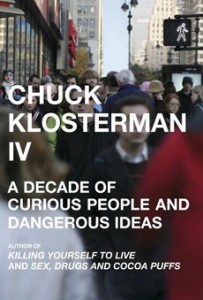 Perhaps what’s better then reading this book might actually be “listening” to it. Which is what I did. Hearing Chuck read this book was alright. But having actors portraying the celebrities Chuck quotes is very entertaining. I like how Chuck thinks. He is the analytical voice that comes off more sympathetic than cynical. He is an evolved man.
Perhaps what’s better then reading this book might actually be “listening” to it. Which is what I did. Hearing Chuck read this book was alright. But having actors portraying the celebrities Chuck quotes is very entertaining. I like how Chuck thinks. He is the analytical voice that comes off more sympathetic than cynical. He is an evolved man.
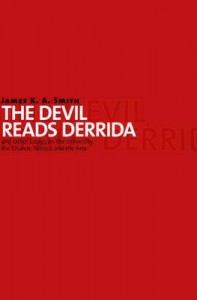
James K.A. Smith is brilliant. He’s also very honest. In this collection of essays and publications he attempts to let you in a little on what he thinks. There is no “sacred cow” that seems out of reach. Whether it’s the incomplete thesis of Jon Eldredges’ “Wild at Heart” or the “Emergent” community, Smith has something to say. It is refreshing to read someone that isn’t only well versed but also very balanced and does not carry allegiances with any particular “Christian” trend.
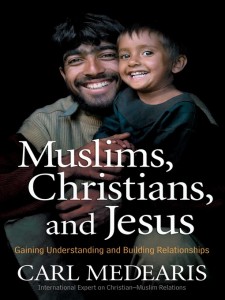
Carl Medearis is another voice the Christian community should be listening to. In this short but profound book he redraws from personal stories what it means to relate with Muslims. There is something delicate and gentle about his perspective that reflects more of Jesus than I ever thought. On the one hand we seldom notice the connections both religions have. The media does not help in painting an accurate picture of what being “Muslim” means. Yet, Carl invites us to look deeper and see the relationship and history we share. For too long we have been arguing about the wrong things rather than loving the right way.
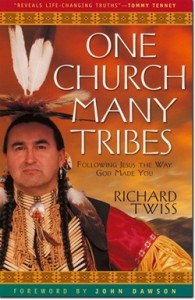
I thank my friend Dan Lowe for lending me this book and introducing me to the richness of aboriginal theology. This book is just a primer on such a vast subject. Prior to this I never put any thought to what other cultures bring to Christian theology and spirituality. After reading this I realize how much we’re missing. Have you ever wondered why so many of the voices we hear in the Christian sub-culture comes from white, middle-class males? Richard Twiss tactfully but forcefully makes a case that the aboriginal community is an essential and relevant part of the Church. Despite the horrendous history First Nations people have had with the Church, Twiss is still full of grace, hope and love. For that reason alone this book is a “must read” for every Christian.
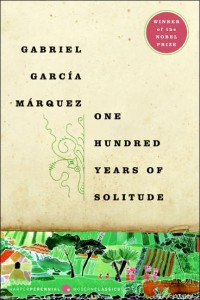
What can I say about this book? It’s tragic, difficult, majestic, hilarious, painful, epic…
This was the second and last book of fiction I read all year. If you’ve read this you might understand why. From the onset you have to wrestle with how Marquez blurs the line of reality and fantasy. Eventually you dive in and you’re no longer re-reading sentences to double check if what you read was accurate. Instead you are welcomed into the Buendia familia and enchanted by the magic and mystery of Macondo. But don’t be fooled by the spell it casts because it is still deeply rooted in the reality of the human condition. Like being surprised by a mirror I caught scary and intimate revelations of myself through the characters and situations Marquez creates. At times I felt embarrassed at how accurate he was and yet other times I was filled with joy in witnessing the enduring zest of the human spirit.
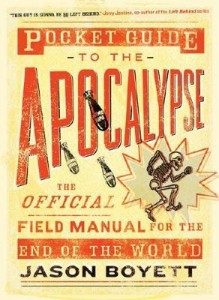
I’m not going to lie. I understand very little about the book of Revelations in the Bible. I thought reading this book would be helpful. It wasn’t. But it was still enlightening. Did you know that at times throughout history people thought Hitler, Pope John Paul II, Stalin, Gorbachev and Bill Gates were considered to be the Antichrist? Interesting historical facts pertaining to the “End of the World” is explored in a witty and fun way. Which coincidentally is how I like to swallow my cup of wrath and 7 years of tribulation.
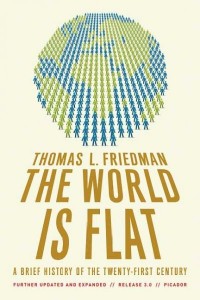
Have you ever wondered why Walmart is so effective? Do you know why call centres are thriving in India and why that might be a good thing for them? When was the last time you considered that the Western empire as we know it may actually be falling behind the rest of the world? Without being an alarmist Friedman takes us by the hand and ushers us behind the scenes of why our world is becoming “flat”. It’s both a fascinating and sobering read that left me questioning where globalization will take us in the next 20 years.
